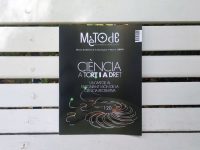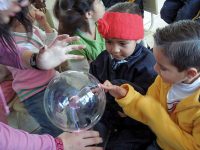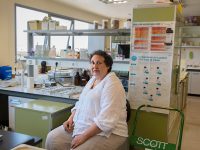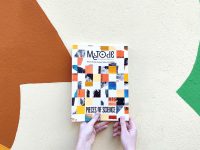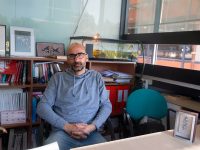|
The writer Antonio Muñoz Molina (Úbeda, Jaen, 1956) has been recently awarded with the Prince of Asturias Award for Literature. Being a man of strong beliefs, he does not avoid controversy in his statements. He has just published the essay “Todo lo que era sólido” (Everything that was took for granted) (Seix Barral), a vindication for the rights earned after years of democratic struggle. An erudite, article writer and champion of the scientific culture, in this interview, Muñoz Molina reflects on the relationship between science and journalism.
Why do you think there is so little scientific information in general-interest media?
First of all, the people that work in that kind of media have usually studied journalism, which is a very superficial degree and, in addition, it is «Humanities degree». Secondly, the media is undergoing an irreversible process of trivialisation in Spain that makes issues like science and literature look “unsellable”. That is a huge contrast with newspapers like The New York Times, for instance, which every Tuesday publishes an extraordinary scientific supplement. There are some respectable exceptions, of course. In El País, Alicia Rivera and Javier Sampedro write very well about science.
Do you think that the journalist-scientist relationship, with some exceptions, is irreconcilable? What are the main differences between both them in your view?
There is no reason why it should be. Both of them share curiosity as the basis of their jobs. There is a fundamental difference, of course, because scientists do not prioritise raising the public’s interest.
Why are you interested in science? Being a journalist, what raised your interest about it?
Well, I am not a journalist. I left the degree very early on, and I have never worked in any editorial office. When I was younger those things would not catch my attention. I was interested in fiction literature, arts, and almost nothing else. My generation, since we had a provincial complex, wanted to be very cosmopolitan and used to look down on nature. In addition, science was very badly taught in schools back then. Physics, chemistry and math lessons were a total nightmare in the Catholic school I went to. I grew interested little by little; I think it was after I came across the excellent popular science written in English.
In «Cuestión de método» (A Matter of Method), published in January 2012 in Muy Interesante, you claimed that a scientific culture is essential to avoid some public life disasters and to create a democratic citizenship. Do you somehow link science with common sense? Do you think that we would have a more sensible society if scientific education was better?
Absolutely. Even taking into account the human tendency to delusion, fanaticism and indestructible certainties. Democracy is close to scientific method: you try one leader out, and if it does not work, another one is chosen. Transparency enables the correction of mistakes, and the greater your reasoning skills are and the more real world information the citizen has, the more difficult should be that the politicians’ clumsy messages catch.
Do you think that the scientific method can be applied in every aspect of life?
Somehow, I do. We should learn to see the world just as it is; distinguish between desire and reality; and focus on the signs that enable us to understand people better.
Are scientists generally isolated from the rest of the world? Why do you think this has happened and how can we solve it?
There is a general lack of awareness of what the scientific method —or the rational and empirical approach to what is real— represents. Imagine all the nonsense people believe about astrology, or history. The human mind is a lazy one: it prefers to do what is told and not make the effort of questioning it. However, a good rationalist education that encouraged curiosity—which is innate to us— would help a lot.
Is the everlasting battle between science and humanities justified? Would you say that fighting against this conflict was one of your goals when you engaged in writing «The Two Cultures»?
That battle is just nonsensical. Humanities and science are inseparable in the human mind. The two adjectives that scientists tend to use to describe a good theory —elegance and simplicity— allude to aesthetic principles. Niels Bohr used to say that language could only refer to atoms in terms of poetry.
Do you think that scientists are too concerned about accuracy and precision even in those areas that are not so predictable?
Scientists do what they do: measuring, weighing, calculating, formulating hypothesis that have to be corroborated or refuted. Learning that even the most unspecific or chaotic things are so according to certain predictable patterns fascinates me. It is true that science has also been mistaken many times, precisely for believing that non-existent things could be measured and classified: human races, predisposition to crime, the application of spurious versions of Darwinism to justify social inequalities. Scientists should beware too.
You usually include your own anecdotes and experiences in your articles. Does everyday-life inspire you to write about science?
My mind works like that: through the association of ideas. Something immediate or trivial leads me to a more general thing, or to another field of knowledge, or to a text. An article is a literary construction whose modest purpose is to make the reader read the whole article.
After having read and written about so many topics, could you define what has caused a greater impact on you or something that has fascinated you, in either a negative or a positive way?
I am shocked by how unreliable human intelligence is, the way it works combining incompatible processes. Culture and scientific knowledge may become useless. People with an outstanding intelligence in a field tend to be complete imbeciles in others. Some people that master technology believe in witches or aliens at the same time. Brilliant scientists take unbelievable political stances. We need to be completely careful.
Has your perception of humans changed in any way over the years?
Curiously enough, science has helped me acquire an idea of humans that is closer to that in Eastern philosophies, especially Buddhism and Taoism (which have nothing to do with new age mysticisms, by the way): the priority of becoming over being, interconnecting with other animal species and nature, a humility that is just the opposite to that kind of monarchy over creatures the Bible teaches.
Mar Sanjuán Santonja. Bachelor of Journalism.
© Mètode 2013.
|
|
«Mass media workers have usually studied journalism, which is a very superficial degree and, in addition, it is “Humanities degree”»
«Democracy is close to scientific method: you try one leader out, and if it does not work, another one is chosen»
|
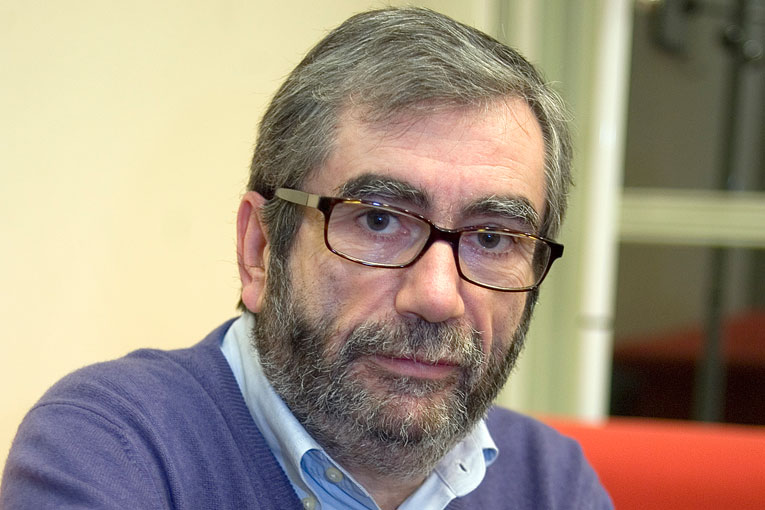
 © Jesús de Miguel
© Jesús de Miguel
